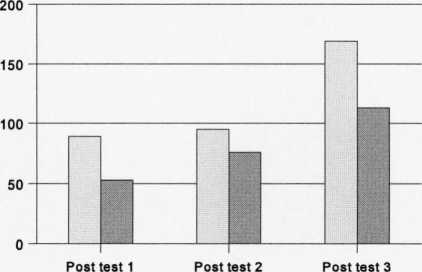Does children's performance on the naming task improve with increased exposure to the
lexical items ?
A Friedman-Two-Way ANOVA was carried out to investigate whether children’s
performance on the naming task improves with increased exposure to the lexical items.
Children’s performance improved significantly across testing (X2=25, df=2, p<.0000). The
analysis was repeated separately for each experimental group. All of the groups improved
significantly over time [Ostensive definition group (X2=7.6, df=2, p<.05), Lexical contrast
group (X2=9.3, df=2, p<.05) Definition group (X2=I 0.4, df=2, p<.005)].
Does the children ,s prior knowledge of the lexical items influence their performance on the
naming task?
By considering all the children together there were 260 responses for the partially represented
items and 260 responses for the unknown items. As Figure 7.2 shows all the children
performed better on the naming task if they already possessed a partial representation of the
target lexical item.
Figure 7.2 Total number of correct responses on the naming task by children’s prior
knowledge of the lexical items across testing

I I Partially represented words
Γ~∣ Unknown words
The differences were significant across testing (Wilcoxon test Pl: Z=3.7, p<.0005; P2:
Z=2.1, p<.05; P3: Z=4.9, p<.0000). The analysis was repeated separately for each
experimental group. The same pattern was found for the Lexical contrast (Wilcoxon: Z=2.8,
p<.005) and Definition group (Wilcoxon: Z=2.3, p<.05) during Post test 1 as well as for the
Control (Wilcoxon: Z=2.9, p<.005), the Phonological control (Wilcoxon: Z=3.2, p<.005) and
the Ostensive definition groups (Wilcoxon: Z=1.8, p<.05) during post test 3.
199
More intriguing information
1. The Functions of Postpartum Depression2. The InnoRegio-program: a new way to promote regional innovation networks - empirical results of the complementary research -
3. Educational Inequalities Among School Leavers in Ireland 1979-1994
4. WP RR 17 - Industrial relations in the transport sector in the Netherlands
5. The name is absent
6. The name is absent
7. Auctions in an outcome-based payment scheme to reward ecological services in agriculture – Conception, implementation and results
8. Philosophical Perspectives on Trustworthiness and Open-mindedness as Professional Virtues for the Practice of Nursing: Implications for he Moral Education of Nurses
9. Subduing High Inflation in Romania. How to Better Monetary and Exchange Rate Mechanisms?
10. Modelling Transport in an Interregional General Equilibrium Model with Externalities